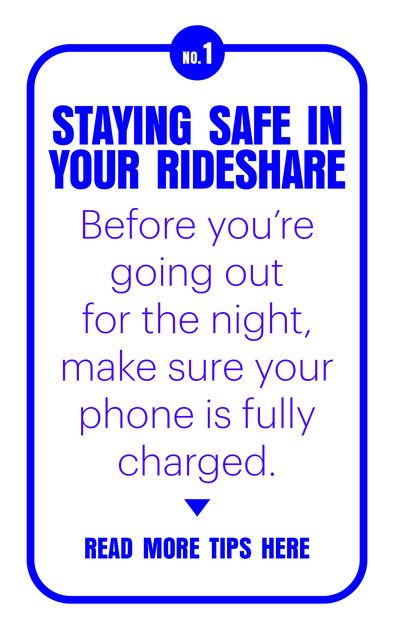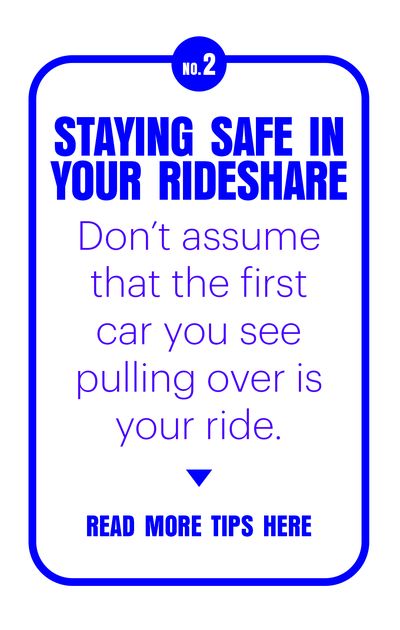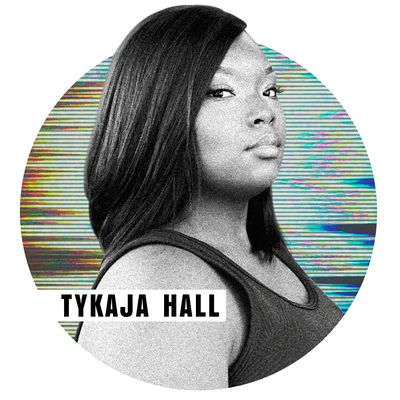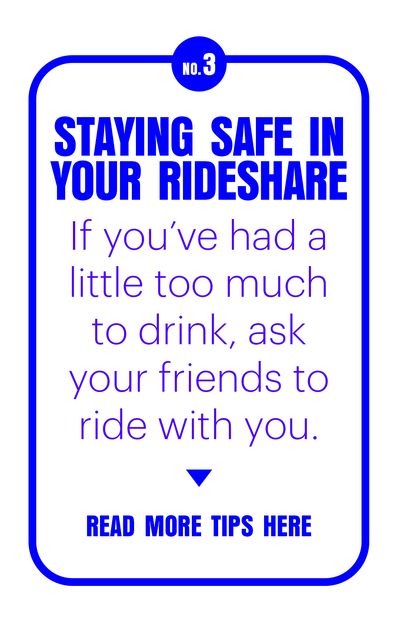The Ride From Hell
A rideshare is supposed to be the safe option after a night out, but for these women, the reality was the opposite.

The stories all start out more or less the same way: “I was trying to be responsible.” “I was trying to take care of myself.” “I thought I would be safe.” And so instead of driving drunk or walking alone or taking public transportation at night, these women hopped into rideshare vehicles. But they weren’t safe at all.
One night, after going out with friends, Hannah Tarr, a nursing student and part-time server, says she “was drunker than Willie Nelson’s dog.” As the 28-year-old stumbled out of a bar, a nice guy sat with her to make sure she was okay and called her a Lyft.
This, by the way, is exactly what Lyft has said it wants people to do. In a 2016 partnership with Budweiser, both companies encouraged people to “Give a damn. Don’t drive drunk” and offered thousands of codes for free rides.
Tarr got into the car that night in 2018 and fell asleep. Her memory of what happened next is patchy, a common outcome for both people who have been drinking and survivors of trauma. The brain often represses distressing memories, allowing them to come back in brief, disjointed flashes. Tarr remembers saying, “No, I’m okay, I can walk” as the driver pulled her out of the car. She remembers unlocking the door to her apartment building in Chicago’s Humboldt Park neighborhood, him pushing in behind her, grabbing her, and kissing her, and then somehow entering her apartment. She remembers feeling frozen, like she couldn’t talk and couldn’t move. And she remembers waking up the next morning and thinking, I just had the weirdest dream.
Then she opened her eyes. All the lights were on. Her apartment door was wide open. Her shoes were on, but her pants were pushed down around her ankles and the bottom half of her body was dangling off the side of her bed. “And that’s when I knew it wasn’t a dream,” Tarr says.
Tarr had been sexually assaulted in college, and her experience with the police had been an ugly one, so she didn’t call law enforcement. She called the Lyft customer-support line. “I was hysterical,” Tarr says. “I told them what had happened, and they said that they would refund me my $12 ride and I would never be partnered with [that driver] again. That was it. They didn’t say if he would be fired. They didn’t say anything.” Tarr says the man may still be driving for Lyft; she has no idea, and Lyft never followed up to give her any other information. (Tarr, traumatized and devastated, didn’t reach out again.)

That day, she called in sick to work. “And for the next three or four hours, I called around to different suicide hotlines and assault hotlines, just, like, ‘I need to talk to someone because I am struggling right now real, real bad,’ ” Tarr says, “which I’ve never done before. I’ve never attempted [suicide] or anything like that. It was a new level of scary.”
Get exclusive access to fashion and beauty trends, hot-off-the-press celebrity news, and more.
Several months later, an ad popped up on Facebook looking for people who had been sexually assaulted by a Lyft or Uber driver. Tarr clicked. That’s how she joined the dozens of women currently suing rideshare companies over sexual assaults and harassment by drivers.
Twenty-nine people from across the United States shared with Marie Claire stories of harassment, assault, and rape at the hands of rideshare drivers. Overwhelmingly, they said they still struggle with the trauma of what happened. They tense up when they get into a vehicle; they’ve isolated themselves from friends and family; they struggle with depression, anxiety, and PTSD; they don’t like to be around men they don’t know. Many also note that it could have been worse. Some women say that the driver “just” physically assaulted them and they feel lucky they weren’t killed.

One woman who says she feels that distorted sense of relief is Brittany Robinson. A 34-year-old mother of five boys who lives in Tuscaloosa, Alabama, Robinson is legally blind. Her children live with their father, and she relies on rideshares to get around. When she wanted to go to the grocery store, she called a Lyft. The driver, she says, followed her into the store and offered to walk her back to the car. He drove her home without turning the app back on and helped carry her groceries inside. He walked around her apartment, sat down beside her on the couch, and then grabbed her arm, guided her to the bedroom, and raped her. Robinson was consumed with shame and confusion. “When you think of someone raping you, you think of someone holding a knife to you, or you see the movies and people are screaming or crying,” she says. “But in that moment, it was fight, flight, or freeze—and I froze. Because I didn’t know what to do. The one thought I had was, I live here alone, I also am blind, and I don’t know if he has something in his hand or not to harm me with. I don’t know what to do. So I just laid there.”
Eventually, Robinson went to the police, who talked to the driver, who told them the encounter was consensual. Robinson reached out to Lyft and talked to a safety officer—a man, which made her uncomfortable. “They were like, ‘We’re sorry this happened. We’ll cooperate with the police if we need to,’ ” she says. “They were really dismissive about it.” The police declined to pursue charges.
Incidents of rape, sexual assault, and sexual harassment have been reported against many rideshare platforms and taxicabs. There are distinctions, according to legal advocates for the plaintiffs we spoke to, between how Lyft and Uber, the two most popular rideshare apps, have responded to complaints. (It’s worth noting that many drivers work for multiple companies. The incidents in this story all sprang from the Lyft app.) In 2017, Uber came under massive international scrutiny for sexual assaults in its vehicles, sexist comments from its executives, and reports of sexual harassment at the company, culminating in a #DeleteUber campaign on social media. Representatives from Uber say that the blowback of 2017 instigated a serious reckoning and resulted in more transparency and accountability. “It required self-reflection from the company,” says Brooke Anderson, who leads global safety communications for Uber, “and a willingness to be accountable to something bigger than the company, and that is the public.” Uber released its first-ever U.S. safety report last year, documenting the number of assaults reported by both its drivers and passengers. Lyft plans to release a safety report (with third-party-audited data) this year. It is clear that the rideshare drivers who harass or assault passengers are a small minority, and in fact drivers (especially female ones) are about as likely to be assaulted or harassed as passengers. Rideshare drivers are gig-economy workers, with all the instability and struggle that entails. But there are a number who do act badly and even criminally; the consequences they face often remain opaque.
Uber has taken steps to address systemic problems, including launching a specialized customer-safety line manned by a human being, training a dedicated safety support team, consulting with sexual-assault-prevention and women’s groups to help create a more survivor-centric approach to safety, requiring driver education, integrating the ability to call 911 directly from the app, and helping connect survivors with a sexual-assault advocate.
Lyft has been slower to adopt some of these tools and strategies, say lawyers for the plaintiffs, adding that the company has done little to respond to the women’s concerns or even confirm that drivers have been removed from its platform. Many women told us that this lack of transparency and what they perceived as disregard and insensitivity compounded their trauma. Lyft refused multiple requests for an interview, but a representative sent this response: “What these women describe is something no one should ever have to endure. Everyone deserves the ability to move about the world safely, yet women still face disproportionate risks. We recognize these risks, which is why we are relentless in our work to build safety into every aspect of what we do. We know this work is never done, which is why we continue to invest in new features, products, and policies to protect our riders and drivers and make Lyft an even safer platform for our community.”
Late last year, after the volume of lawsuits against Lyft became public, the company did announce new safety initiatives, including a partnership with the Rape, Abuse & Incest National Network (RAINN), mandatory safety education training for drivers, access to 911 from the app, and a mechanism for Lyft to check in with riders and drivers if the app detects a ride veering way off course. According to victims and their lawyers, it hasn’t been enough.
“In the litigation process, Lyft has accepted zero responsibility,” says Michael Bomberger, the founding partner of Estey & Bomberger, a California-based law firm that handles cases throughout the U.S. and has filed lawsuits against Uber on behalf of four women and against Lyft on behalf of nearly 40. “And the message to survivors and victims [seems to be], ‘We don’t care about you and we aren’t going to do anything for you.’ ”

Adds Laurel Simes, a founding partner of Levin Simes Abrams LLP, a female-led San Francisco law firm that has taken on more than 100 of these cases: “Regardless of whether the driver is an employee or an independent contractor or whatever, [the company] set this up so that strangers are getting into strangers’ cars and [it] is making money from it.” Individual cases against Lyft filed by Levin Simes Abrams LLP and Estey & Bomberger, among other firms, have been consolidated into a Judicial Council Coordination Proceeding (JCCP) to be handled together in a single court. As part of the JCCP, additional cases are not being filed for now (but that could change in the future).
Tykaja Hall, a 22-year-old student in Minnesota, is represented by Estey & Bomberger. She was celebrating a friend’s birthday on New Year’s Eve and, like many revelers, had overindulged. “We were being responsible by not drinking and driving,” she says. A friend called the two of them a car. When the friend got out, the Lyft driver offered to turn off the app and—saying he lived nearby—take Hall home for free. Instead, he urged her to drink alcohol, then drove her around for hours, taking her to a hotel parking lot where he got into the back seat and raped her as she tried to fight him off. Hall got him to stop only when she purposefully urinated on herself.

Tykaja Hall, a 22-year-old student in Minnesota, is represented by Estey & Bomberger. She was celebrating a friend’s birthday on New Year’s Eve and, like many revelers, had overindulged. “We were being responsible by not drinking and driving,” she says. A friend called the two of them a car. When the friend got out, the Lyft driver offered to turn off the app and—saying he lived nearby—take Hall home for free. Instead, he urged her to drink alcohol, then drove her around for hours, taking her to a hotel parking lot where he got into the back seat and raped her as she tried to fight him off. Hall got him to stop only when she purposefully urinated on herself.
“I want people to know that this is happening, and I don’t want it to happen again to other girls or other women,” Hall says. “I am [suing] for the awareness. What happened with me, it was very obvious that the man had done it before. It’s crazy how this can keep happening.” The driver who assaulted her pleaded guilty to criminal sexual conduct in the fourth degree, a felony for which he received 45 days in jail and 10 years of probation. Still, Hall says she’s heard nothing from Lyft.
Many of the women who spoke about being assaulted in rideshares expressed their concern that, without professional consequences, the drivers’ actions could escalate from harassment—commenting on a rider’s appearance or masturbating with a rider in the car—to more violent assaults.
For Jade, a young woman who had just moved to Providence, Rhode Island, her 25th birthday should have meant dinner and drinks out with her boyfriend. (To protect her privacy, Jade is using her first name only.) Instead, she ended the evening trapped in a Lyft as the driver first asked her invasive personal questions—Where did she live? Who did she live with? Where were her parents?—and then, knowing she was new to town and alone, drove far off course in a city she didn’t know well to an abandoned industrial lot. He parked, shut off the headlights, and unbuckled his seat belt. Jade is a registered respiratory therapist at a large hospital and is used to high-stress circumstances. “So in the moment, I took a deep breath and I said, Okay, I am most likely going to be raped,” she says. He told her to put her phone away. She told him that there were people waiting for her, and eventually he restarted the car but ignored the GPS directions. Finally, Jade recognized a street near her house and jumped out.

She reported the incident to Lyft, and the response was “a slap in my face,” she says: “We’re sorry for the inconvenient ride. We hope your next ride is better.” She filed a police report, which she offered to hand over to Lyft, but the company didn’t seem interested. “I deal with death on a daily basis,” Jade says, “so I feel very strong. But this situation brought me to my knees for a long time. It got to the point where I could not take the train to work without bawling my eyes out. Weird things would throw me into a panic attack.” She knew the driver had her home address from the ride, and she worried he’d show up at her house. She decided to move out of the city.
India M., 26, owns her Seattle home and can’t relocate quite as easily—which is why it’s extra scary that the Lyft driver who harassed and assaulted her knows where she lives. (For privacy, she is not using her full name.) He first made inappropriate comments to her, then followed her up her stairs, where he tried to pull her toward him. She got away and he left, slapping her backside on his way out. Police reviewed India’s security-camera footage, which showed him in her stairway rubbing his genitals. The video also showed him returning 30 minutes later and trying to get back in.
When India reported the incident to Lyft, the company told her that she wouldn’t be paired with that driver again. “And it was like, ‘Okay, what about anybody else?’ ” India says. Lyft did not confirm for her whether or not the driver was terminated or banned by the company, but the company’s counsel told India that he no longer drives for Lyft. “I am six foot one. I am an ex–basketball player. I am pretty athletic and strong,” India says. “If someone looks at me, [he’s] not going to be like, ‘Oh, easy target.’ For him to have made that approach on me makes me feel like this was either an extremely bold first attempt, in which case he’ll probably do it again, or this was not his first attempt and he’s tried with easier targets—people who are smaller, weaker, maybe more intoxicated.”
The driver pleaded guilty to assault with sexual motivation and received a suspended sentence of 24 months. India hopes this means Lyft had cause to terminate him. Now that she’s filed a lawsuit, it feels like company officials are dragging their feet in reaching a resolution. “It’s their job to defend themselves, I get that, but it’s very frustrating to be part of this process and have it take so long when you have evidence that is irrefutable,” India says. “Because it’s not a ‘he said, she said.’ I have video evidence and a sentencing by the court.”
Meghan McCormick, an attorney at Levin Simes Abrams LLP who works closely with rideshare assault survivors, says the goal is to see Lyft “owning what has happened to women in the past and owning the behavior of drivers going forward—addressing the problem and doing everything [it] can to make sure it doesn’t happen to other women.” She adds that the tech company “has come up with solutions and innovations that I could never have imagined; I have no doubt that if [it] wanted to do something about this problem, [it] could have put an end to these assaults.”
With few other options on the table and an expanded awareness of the significance of this problem, the women are seeking damages from Lyft. But ultimately, they say it’s more about seeing the company accept responsibility and make concrete changes to keep riders safe in a profoundly private and vulnerable situation.
“It’s so easy,” says Jade. “You get in someone’s car and they can drive you wherever they want, and who’s going to stop them?”
Alison Turkos
It has taken Alison Turkos years to piece together, and come to terms with, what happened after a Lyft driver picked her up from a Brooklyn bar in October 2017. She had been out celebrating with friends on a Friday; she woke up Saturday morning and remembered nothing about her ride home. Her body hurt so badly, she couldn’t move. When the Lyft app asked her to close out her ride from the night before, she was stunned to see that it was $107.95 and that the map showed they’d driven into New Jersey. She reported the bizarre trip to Lyft, saying that her driver appeared to have kidnapped her. “Lyft’s response was so blasé and callous and robotic,” Turkos, 32, says. “[The representative told me] ‘I don’t think this happened. What I think most likely happened is he dropped you off and he continued the ride.’”

As Saturday progressed and she noticed she had vaginal bleeding and discomfort, Turkos began to put the pieces together. With a friend accompanying her on Monday, Turkos went to the hospital for a rape kit and agreed to talk to the police. Before she spoke with law enforcement, Turkos messaged Lyft again to say she was considering filing a police report and asking—naively, she says now—what that would look like in collaboration with the company. Lyft never responded.
Her police complaint stalled for months and was eventually marked “inactive” without Turkos’s knowledge. After Turkos filed a formal complaint with the NYPD, her case was reopened and reassigned. To help trigger Turkos’s memories of that night, two new detectives asked if she would be up for a reenactment: driving the same route her Lyft had taken the night in question.
It worked. Turkos remembered being raped. She remembered three men and that they wondered aloud where they were going to dump her body. “It was really hard to go in knowing nothing and come out knowing so much,” Turkos says. The rape kit found two men’s semen on her clothes. Because the crime crossed state lines, the FBI got involved. Still, no arrests have been made. Lyft, Turkos says, has stonewalled her at every turn. “My body is constantly in pain because I carry so much stress and tension,” she says. “This has dramatically changed the person that I am, to the DNA. Down to the marrow of my bones.”
Alice
Alice, a 24-year-old who was living in Florida (and is using a pseudonym for privacy), called a Lyft from her office and sat in the front seat (something Lyft has historically encouraged passengers to do). The driver told her how beautiful she was and asked if he could kiss her. She said no several times, but he persisted, putting his hand on her thigh. Confined in a moving vehicle and unsure of what else to do, she pulled out her phone and began to Instagram Live the interaction; as her friends watched, they furiously texted her to end the ride and get out of the car. She did. Alice called and emailed Lyft and says a representative apologized and told her she had the right to end a ride if she felt uncomfortable.

“It’s absurd that she said that because no one should ever feel or be in an uncomfortable situation like that,” Alice says. Lyft didn’t refund her ride. Alice says she sent the video to Lyft but never heard anything back. She has no idea whether the driver is still on the road. “I wish I did know,” she says. “Even if he didn’t do anything beyond touch my thigh and ask me weird questions, I would feel better to know that he’s not driving and not putting someone else in a situation like mine or something worse.”

Divine London
Divine London, a 55-year-old transgender woman living in Las Vegas, called Lyft after a shopping trip to Walmart in March 2019; her vision is impaired, and so she often relies on rideshares to get around. The driver repeatedly asked if she was the person whose name was listed on her account, and she kept saying yes. At one point, he pointed to his crotch, which London found disturbing. Then, she says, “we got to a stop light on a major street, and he grabbed between my legs. Squeezed—like to see if bread was fresh.”
She was shocked by the violation but felt trapped in the car. They picked up another couple, which made London feel safer, and drove to her house. The driver got out and followed her inside, where he groped her private parts again.

London reported the assaults to Lyft the next day. “I didn’t get my money back,” she says. “I didn’t get an apology. [The representative] stated she was going to email me. I never heard back from her.”
London went to the police, who, she says, weren’t much help. A few months later, though, the detective in the case confirmed that the man was still driving for Lyft. So London called Lyft and says that, again, she never heard back.
“He’s left me the flashbacks and wake-up nightmares, dreams of being a victim,” she says. “[I] can still feel the grab. That whole area…it hurts.” A therapist diagnosed London with PTSD, and she’s working on her recovery. But the assault has badly upset her sense of security and of herself. It has shaken her so badly that she’s stopped taking hormones and paused her transition process, feeling unsafe in her feminine body. “I feel like I was raped from Lyft. From him,” London says.
Lorelei
Lorelei (a pseudonym) was 30 and living in the Seattle metropolitan area. She was in the process of signing up to be an Uber driver. After a night out in July 2018, she was locked out of her Uber account, so she called a Lyft; it was her first time using the service. Lorelei blacked out and woke up naked in her own bed. When she got up to use the bathroom, a man was on her couch: her Lyft driver. He told her that they’d had sex. She went to the hospital for a rape kit and emergency contraception, as well as STD testing and prophylaxis, which brought on extreme side effects.

About three weeks later, she went to the police, who Lorelei says were disrespectful and accusatory. She worried about reporting the incident to Lyft. “You don’t know what that person is going to do,” she says. “He knows where I live, and he knows I live alone.” Nothing came of the police report. Soon after, she reported the incident to Lyft too. A Lyft supervisor told Lorelei they were very sorry and that they were going to suspend the driver’s account, but she doesn’t know if the company did or if it took any further action. “#MeToo is great, but for every person who’s been a victim, every time you hear it, it impacts you,” Lorelei says. “You have to go back through those emotions and the disbelief and the blame.”
D
D (who is using her first initial to maintain her privacy) called a Lyft to take her from a Philadelphia train station to a music festival where she was performing as a stand-up comic in July 2019. The driver told her to sit up front because he was picking up two other passengers; he then spent the ride making advances and asking if she would be his girlfriend, if she would hold his hand, and if she would give him a hug. He drove to a secluded underpass, parked, and demanded she kiss his cheek. D, 52, scared and alone, complied. He grabbed her and began kissing her and licking her face, pushing her head down to his neck and telling her to suck on it. He began masturbating. When he finished, he drove on and picked up the two waiting passengers.

“We get to my destination, and he’s like, ‘You aren’t going to tell Lyft, are you?’” D says. She said she wouldn’t. A few hours later—once she felt safe and no longer in shock—she called the police. The male officer was dismissive, she says, asking why she didn’t run away or call for help. “I was like, ‘Because I didn’t know if he had a weapon, if he was going to take me and dump my body somewhere,’” D says. When she reported the incident to Lyft, the company “told me I would have a 24-hour person I could call any time, so they gave me this guy’s name and number.” She called it twice and got a busy signal both times. D is now in therapy for PTSD and has lost a dangerous amount of weight. Lyft eventually told D it had fired the driver, but “I have no way to know if they really did,” D says. “He probably is working for Uber now. And I had to ask them to refund my money for the trip.”
Erin Colleen
Erin Colleen, the first and middle name of a 35-year-old Tucson, Arizona, woman, called a Lyft to take her home after a night out in March 2018. Instead of driving to her house, the Lyft driver parked, got into the back seat, pulled Erin’s top down, and photographed her breasts. Then he drove her to a remote location and raped her. Despite being trained in self-defense, Erin was immobilized with fear. “There’s not just a fight or flight response,” Erin says. “There’s the freeze response. You can be a trained fighter like me, and as soon as I realized [what was happening], I froze.”

When the man began driving again, Erin panicked that he was going to take her to an even more remote location. She told him she was going to throw herself out of the car if he didn’t take her home immediately; he complied. When Erin got home, her husband called the police and she had an examination. As that was happening, her husband called Lyft; he says a representative told him that the company had banned the driver. Prosecutors offered the driver a plea deal for unlawful imprisonment, not a sexual-assault charge, which he took. He received a brief probation and was not placed on the sex-offender registry. “When I started opening up more and talking about it, the response that I got was, ‘Thank you for sharing this and being brave, because when it happened to me, I was too ashamed to talk about it,’” Erin says.
Jill
Jill, the first name of a 39-year-old woman in the Bay Area, was excited to see Lauryn Hill perform live at a theater in Oakland on New Year’s Eve 2018. It was a great show, and after it ended, Jill called a Lyft to get home. When her driver took her on an odd route, she figured it was because he was picking someone else up. But then he started talking about his penis size. “And at this point I’m like, Oh, fuck,” Jill says. “And we haven’t picked anybody up. And we’ve turned onto this dark road.” He pulled over, jumped in the back seat, pulled down his pants, and started grabbing at her breasts and trying to pull off her pants. “I say, ‘You’re not taking me home, are you?’ And he says, ‘Not unless you fuck me.’” Jill managed to push him off and jump out of the car, only to find herself on a dark, empty, and unfamiliar street far from home.

She called a second Lyft. “I got home safely and I didn’t say a word to my husband,” Jill says. “It took me a day and a half. I was in a fog. By January 2, I called Lyft and reported it. I didn’t file a police report; now I feel like I should have done that. But, New Year’s Eve in the middle of Oakland, somebody tried to grab my tits? There’s shit happening on the street that’s serious, and I didn’t want to waste resources to report it.” Despite Jill’s report to Lyft, the company never confirmed whether the driver was still active on its platform.
Elizabeth
Elizabeth, 36, works in the beer industry in the Bay Area. (She is using just her first name to protect her privacy.) One Monday night in July 2017, she stayed out late to celebrate a friend’s impending move to the Midwest. Elizabeth worried walking home wouldn’t be safe, so she called a Lyft. “The next thing I remember is we’re outside of my apartment and I can’t find my phone,” she says. The driver followed her into her apartment, held her arms down, and sexually assaulted her in the doorway. Elizabeth reported the assault to the police, went to the hospital for an exam, and emailed Lyft to make a formal complaint; in addition to the assault, the driver had apparently been cruising around town, and she was charged $66 for what should have been a one-mile ride. She asked the company to make sure the guy was off the road; Lyft was noncommittal and never confirmed the driver’s status.

A month later, the Lyft driver contacted her via Instagram to tell her he had her phone. On the advice of police, Elizabeth called him from the police station to get him on the record admitting what happened. He never picked up. The last she heard, he had moved out of the country. “I went into a dark depression where I was a total recluse,” Elizabeth says. She spiraled downward. And while the lawsuit and speaking out about what happened has given her a sense of purpose and a feeling of strength, she’s not who she was before the assault. “Still, I don’t date. I don’t see myself as someone who could, really. I don’t really mind that situation, but my loved ones and friends are disappointed. I think they think I deserve to be loved. And, sure, but I don’t trust people.”
Morgan
Morgan, 29, (who is using only her first name) was out in the Detroit area celebrating two friends’ birthdays in May 2019. When the bars closed at 2 a.m., she called a Lyft to take her home. “We were celebrating, and I didn’t want to drink and drive,” Morgan says. “That’s why I was using the safer option.” She got into the car, and although her memory is fuzzy, she remembers the driver telling her she was pretty and that she should come sit up front with him. Morgan says, “The next thing I remember is waking up facedown over my bed and him inside of me in my apartment.”
The next morning, ashamed and alone, she tried to shower off the humiliation. “I tried to pretend that it didn’t happen for a few months,” Morgan says. And then, when she was taking another Lyft, she told the female driver her story, initially saying that she had slept with her Lyft driver, then clarifying that she had been drunk and woke up to him having sex with her. “She was like, ‘Honey, that’s like rape,’” Morgan says. “I had had this uneasy feeling about it, and I just didn’t really put that name to it.”

Morgan reported the incident to Lyft; she says the representative told her they would “deactivate him on their platform.” (Morgan also says that the price of the ride was twice what it should have been; she has no idea what happened in the car during that time, and Lyft did not refund her ride after her sexual-assault report.) She also called the police, but when she told them the incident had happened four months earlier, the person on the phone asked, “Why did you wait so long?” “I freaked out and was like, Okay, I am not going to report it,” Morgan says. She still has PTSD and nightmares, but the incident, and her response to it, has shown Morgan just how strong and resilient she is. “He was somebody who was supposed to be responsible for getting riders home safe,” Morgan says. “He was completely sober. He was on the job. And he saw an opportunity to take advantage and he did.”
Ellen Peebles
In March 2019, Ellen Peebles, 45, called a Lyft to take her to meet some friends for happy hour in Norfolk, Virginia. The driver started out making advances, telling her it was his “lucky day” as soon as she got in. He talked about his sexual prowess and mistresses and asked for her phone number. When she wouldn’t give it to him, “that’s when he got pissed,” Peebles says. “He put his hand on my left leg. He was like, ‘What do you mean you’re not going to give me your number? Am I not good enough for you?’ Then he grabbed my hand. And he was like, ‘I’d be the best lover you’ve ever had.’”

She told him she wasn’t available, trying to soothe his ego. But the entire time, she says, “I felt so sick. I was in the middle of a full-blown panic attack. I’m not gonna make it. He’s gonna rape me.” She began thinking about how she could escape and whether she should open the door and jump into traffic. Peebles, luckily, made it to her destination. “I know some stories that are a hell of a lot worse,” she says. “But I don’t think I’ve ever been that terrified in my life. The fear was very, very real.” She notified Lyft immediately, emailing from the restaurant bathroom. “I think they gave me a $25 credit toward my next ride, which was an insult.”
Sapphira Nan
Sapphira Nan, 23, went out with some friends for sushi and drinks in July 2017. She called a Lyft to take her home and fell asleep in the backseat. She woke up to the driver touching her legs and putting his hand up her skirt.

She got out of the car as quickly as she could, accidentally leaving her phone behind. When she used Find My Phone on her MacBook, she saw that the driver had turned off Find My Location. She called the police, who said another rider could have taken it. The next day, she contacted Lyft to report both the assault and the stolen phone; the company got back to her to say that the driver claimed he didn’t have it and she would need a subpoena to take the claim any further. Nan gave up. “I would like there to be more safety and fairness,” she says. “And more steps taken to prevent these kinds of situations from happening.”
Stor’me Raine
In May 2019, Stor’me Raine, the pseudonym of a 75-year-old Georgia woman, was picked up in a Lyft ordered by a transportation company for the elderly and disabled and paid for by Medicare/Medicaid. The driver repeatedly asked her, “Do you feel good?” to which she politely replied that she felt fine. He drove her to an underground parking area, then climbed into the back seat with his pants open.

He groped her and asked, “Do you feel good yet?” “I realized he was going to rape me and/or kill me,” Raine says. “I told him I had been recently diagnosed with HIV. He jumped off me and got back into the driver’s seat.” She tried to jump out of the car, but he started the car too quickly. “He took me to my destination, told me to get out and do not call him back again,” Raine says. She remains afraid to ride in Lyft cars. She has nightmares, trouble sleeping, high blood pressure, and stomach issues. She sees a psychologist each week, but, she says, “I am unable to have sexual relations because I am fearful of all men.”
Kim Natural
Kim Natural, a 26-year-old Salt Lake City woman, was riding a scooter home after a combined friend’s graduation and her birthday celebration in December 2018 when a Lyft vehicle pulled up alongside her. “It’s too cold to ride a scooter home,” Natural recalls the driver telling her; he offered her a warm ride, and she accepted, ordering the car via the Lyft app as soon as she got inside. Immediately, the driver began commenting on her appearance. “I was feeling unsafe but sat quietly knowing it was a short ride to where I lived,” Natural says. “When we arrived outside of my house, the driver grabbed me around my neck and tried to forcefully kiss me. He kept saying all he wanted was a goodnight kiss.” They struggled, and Natural managed to push him off and run inside.

Natural reported the assault to both Lyft and the police. “All I asked for from the DA’s office was to forbid the man who assaulted me from driving for rideshare companies,” Natural says. “Despite the man pleading guilty to battery, the court was unable to prohibit him from driving.” When Natural inquired about the driver’s status with Lyft, it was unable to disclose the driver’s status. (Later, she says, when the case was covered by USA Today, Lyft confirmed to reporters that the driver’s account had been deactivated.) “The assault has negatively impacted every aspect of my life: mentally, emotionally, and physically,” Natural says. She’s found herself isolated from friends and family; she sees a therapist regularly. She says, “My safety was violated, and the consequences affect me every day.”
Alison McNelis
Alison McNelis, 33, lives outside of Portland, Oregon, and back in November 2019, she was excited about a night out with friends. Her fiancé drove the two of them to the bar but left early because he had to work the next day; McNelis stayed. When she was ready to leave, she called a Lyft, and a driver with Uber and Lyft stickers on his vehicle appeared. He told her the app wasn’t working and that he would still drive her, but she should cancel the ride. When she had trouble figuring out how to cancel, she handed her phone to him so he could cancel it for her. When she reached for the back-door car handle, the driver opened up the front passenger door and invited her to sit next to him. McNelis didn’t want to be rude, so she got in.

After a few blocks, though, he began rubbing her leg. She tried to inch away and said she was engaged, but that didn’t deter him. When they pulled onto the highway, she says, she froze in fear. “I noticed that the picture on the Lyft app was clearly not the guy who was driving me,” McNelis says. “I remember thinking to myself, How bad would I hurt myself if I just jumped out of the car?” When they arrived at her home, she threw him a handful of cash and went inside. “I thought over what had just happened and wondered if I was being ridiculous and dramatic or if the entire encounter with this driver had in fact been creepy and inappropriate,” she says.
“I definitely refuse to use any ridesharing service when I’m alone and am just overly paranoid overall; I’m much more diligent about my surroundings,” McNelis says, but she places the responsibility primarily on Lyft: “I also want Lyft to pay for their lack of compassion and action,” she says
Ashley
Ashley, the first name of a 34-year-old Los Angeles woman, hadn’t had quite enough to eat when she went out for an after-work celebration in November 2019. A friend noticed she was tipsy, called Ashley a Lyft, and let Joe, Ashley’s husband, know that Ashley was on her way. Ashley fell asleep on the ride. When she woke up, the driver told her she was pretty and asked if she was married; Ashley said yes and showed him her wedding ring before falling asleep again. The next time she woke up, “the driver was on top of me in the back seat, with his tongue in my mouth. He was kissing and groping me,” she says. “I remember pushing my arms up, crying, ‘Get off me, I have to go.’”

When Joe noticed it was taking too long for Ashley to get home, he texted her friend. The friend said that the Lyft app indicated Ashley had been dropped off 15 minutes earlier. “That’s when I noticed a strange car across the street,” Joe says. “I went outside and was walking toward the car when a man jumped out of the back seat to the front and peeled out. That’s when I saw that my wife was passed out in the back seat.” In a panic, Joe called the police and got in his own truck in pursuit. “I was so terrified, feeling trapped and lost,” Ashley says. “[The driver] didn’t tell me where he was going. I threw up in the car.”
Forty minutes later, the police found the car, pulled it over, and arrested the driver for kidnapping. Joe says, “My entire world imploded when I saw the Lyft driver take off with my wife to who knows where [and] not knowing what he had done or what he would do next. As a man, I want everyone to know that sexual assault is not just a women’s issue,” Joe says. “It affects everyone around [a woman]—her husband, her family, her friends.”
M.T.

M.T. is a 37-year-old Chicago woman using only her initials to protect her privacy. Injured and on crutches, she was sharing a ride with another passenger en route to a doctor’s appointment in December 2019 when, after dropping the other person off, her Lyft driver canceled the ride. She explained how to navigate to her destination, and as he drove, he asked her if she had a boyfriend, then asked her for sex. At that point, she yelled at him to let her out; he stopped, opened up her door, and groped her from her breasts down to her stomach. M.T. states, “By this time, I knew that I was going to be raped.” After he assaulted her, the driver got her crutches from the car’s trunk and let her go.
M.T. immediately notified both Lyft and the Chicago police department. She received a generic email response from Lyft and a phone call, and the police took her report, but neither followed up with her, and she has no idea whether the driver is still on the road. “This assault has had me depressed, hospitalized [with] suicidal attempts and nightmares,” M.T. says. She came forward, she says, “to protect myself and other women from this monster.”
A shortened version of this story appears in the Summer 2020 issue of Marie Claire.
Jill Filipovic is a lawyer and journalist who covers gender issues, politics, and global affairs.
